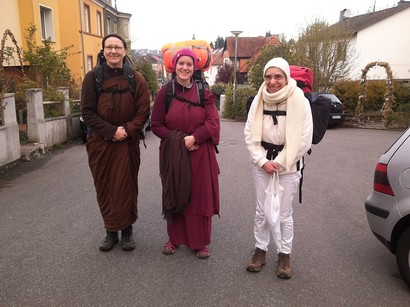 What does it mean to go on Tudong?
What does it mean to go on Tudong?
Tudong is the Thai way of pronouncing the Pali word dhutanga which describes some ascetic practises the Buddha allowed for the purpose of training. But leaving aside these special ascetic practises, the lifestyle of monks and nuns at the Buddha’s time was quite different from what we find today in Western countries. Back then they would—apart from the Vassa retreat—wander through the country for much of the time, not knowing where food and shelter would come from for today, not to mention for tomorrow! In Western countries this lifestyle can not be practised permanently, first because of the climate and second because as wandering ascetics monastics would not find enough support in a non-Buddhist environment. But to practise this traditional monastic lifestyle for some time in an adapted way can be very inspiring, and that is what has become established as “Tudong” in countries like Germany.
Practically speaking, this means to wander around, depending on donations for almsfood and accommodation (the laws in Germany do not allow to camp outside in nature except for special camping sites). We would carry backpacks with sleeping bags and camping mats, the nuns’ almsbowls and a few other necessary items.
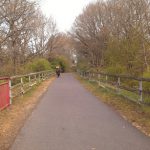

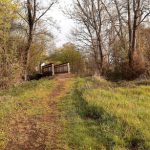
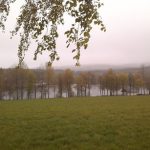
For me it was the first time in my life I did something like this, so everything was new and full of surprises. But my two companions were both experienced Tudongers already, both of them in quite different ways.
For Samaneri Viveka this was the 6th time she went on Tudong in Germany, up to 6 weeks in one bit, the last time having been 4 years ago. With her Tudong groups she usually found sufficient support, the accommodation often being given by the priest of the village in some parish room. Samaneri Kathrin had been on Tudong in Australia for one year, being thrown at with bottles and rocks next to experiencing support as well. So what would await me?
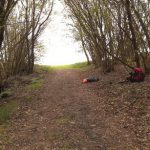
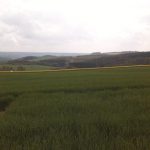
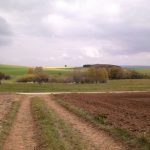
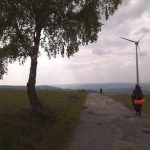
Our aim was to walk from St. Wendel, Saarland, towards Belgium, close to where the new monastery Tilorien is going to be built, or as far in this direction as we would be able to get in 2 weeks time. A kind friend at St. Wendel offered us the first night’s accommodation, so that was where we started. We would walk through the hilly region of Hunsrück and, after crossing the Mosel river, continue through Eifel. Both belong to the German average mountains with rather rough climate and living conditions especially in their higher parts. And consequently many of the villages are gradually being left by people. In the bigger towns along the rivers the climate is milder and more work places are available. The closer we approached the Western Eifel towards the borders of Luxembourg and Belgium the more halfway abandoned villages we would find.
As a consequence we often found much less infrastructure than we had expected. Especially the religious infrastructure is going down remarkably: In many villages there is no pastor living in the parochial house any more, one priest being responsible for, in some cases, over 20 villages! And this is not yet the end of this development.


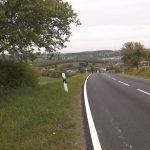
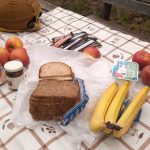
And still we found so much support on our way! This was one of the most overwhelming aspects of this adventure to me, how well we were supported, and often in very unexpected ways. Not a single night we had to sleep outside in the open, and each and every day we had something to eat. In some cases people even thanked us for asking! If you want to find the angels who live in a country, go on Tudong!
On one hand there are less and less people going to church. But does that mean there is no spirituality? At least we encountered such qualities as generosity, kindness, trust, religious tolerance and open-heartedness which was sometimes very moving. There was this young farmer who told us about his youth as an altar boy, and this left its marks on him, even if he is too busy now to go to church; and the old farmer who was so happy to see “real” Buddhist monastics whom so far he knew only from TV. They made their auntie prepare slices of buttered bread for us and added some fruit and curd.—The lady, this time a Buddhist, who in the bakery, after the shop assistant had packed some bread rolls for us, came up: “Please add 3 croissants on my account!”—The boss of a supermarket who within three minutes assorted a most amazing dana for us, consisting of entirely vegetarian food and comprising everything that is needed for a meal to be complete and healthy.—The keeper of a tourist office who called the mayor in order to find us an accommodation, and then left us alone in the shop while going to pick up the key.—The owner of a small village supermarket whose eyes started sparkling with joy when she was asked if she would like to contribute to our meal for the day: “Yes, I want!” And she packed us a bit of everything and in the end added a bag of gummy bears on top—so sweet!—The lady who invited us into an empty house she was taking care of in the name of the former owner’s heirs, and then went for shopping and brought us not only a breakfast for the next morning, but more than enough food for the entire day. And while we had breakfast she joined us and spoke about her own spiritual practise as a lay person, following teachings of the Carmelite order.—Or the butcher’s family who not only gave us something from their shop as almsfood but invited us to sit next to their house and served us coffee, bread, butter, sliced sausages and home made jam, and we could make them very happy by chanting a traditional Anumodana to thank them. And this list could be extended ever more…
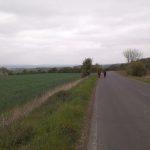
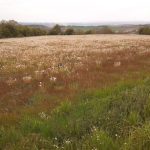
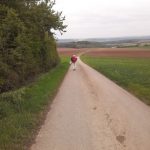
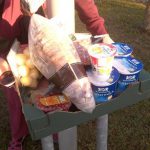
Where did we spend our nights?—We had so different accommodations as an old peoples’ home, a sisters’ home of Franciscan nuns, rooms belonging to the church as well as to the town’s council, the changing room at a soccer field (with a bag of potato crisps for each of us for next morning’s breakfast!), a school, a flat belonging to the fire brigade, the house of a late priest and a mayor’s mother’s empty house; instead of offering us some public room this man kindly opened this private home for us. Sometimes it took us a while to find our place, but there was always a solution to be found!
And how did we get our almsfood?—We were generously supported by shops like bakeries, supermarkets, butchers, and also by restaurants, sometimes old peoples’ homes, and private persons. They didn’t know Buddhist culture of going on almsround, but some were really interested to learn something about our practise and the way of living of nuns. And some were just supportive because they respected the fact that we did this pilgrimage walk, or simply the fact that we didn’t ask for money but for food.
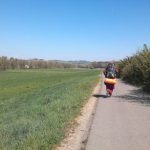
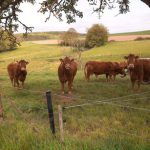
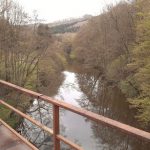
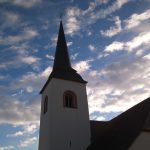
To me it was very inspiring to walk through nature, especially early in the morning—even if it was cold sometimes, like 2° C; I very much liked the special light and atmosphere of this time of the day. And the hilly but wide and open scenery with not much going on provided an ideal framework for a contemplative and mindful attitude. Even if my body would protest at times, not being used to this kind of exertion, it was good to just take one step at a time and be right there in this moment.
The first stages of our walk were also a walk through family history for me. Great-grandparents of mine, both from maternal and paternal side, grew up in the areas around St. Wendel and around Primstal. And remembering the hard lives they had I felt very appreciative for the good things they had brought into the family and transmitted to the following generations. In addition to that I was reminded to my paternal family heritage by my lay name “Backes” which is very common in this area, having its origin in the town of Theley, not far from where we came along. It is so common in this whole region that as it seems every second shop, be it bakery, electric shop, building company or whatever, is called Backes, most of them, however, having no family relations with each other.
Yes, physically this whole adventure was a big challenge! The backpack was heavy, my body was weak, my feet swollen. Exhausted as I was, I still had difficulties to sleep at night. Out of four big blisters we had on our feet three were on mine, one of them “size A4”, as someone called it… I just had to walk slowly. We also would adapt the length and difficulty of our stages to our condition. So at some point we gave up our ambition to reach the place where Tilorien will be built, or even the place of the provisional monastery (which would have been one or two day’s walks less already)—this is not the purpose of a Tudong anyway: to achieve something. And on our last day we just managed to cross the Belgian border and reach the first town, Bug-Reuland!
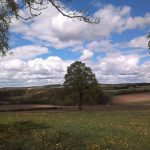
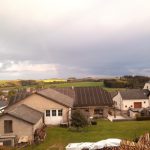

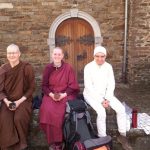
Of course it would also rain sometimes. For this case we had rain ponchos with us, two of them the same model which was not completely waterproof. But, thanks to our angels, each time we were really wet we found an accommodation with proper heating so that we could dry our clothes and get warm again, and usually there would also be a kettle available so that we could make ourselves a hot drink. Nothing is for granted in this life, not even a hot drink! But each time we really needed one we got one.
Did we use money on this Tudong? In principle no, but I—the Anagarika—carried some money with me for emergencies. And there were indeed three occasions where we used it: For the first time it was when we arrived at Oberemmel after about 20 km walk which was the longest stage we took in one day. We had been told that there was a resident pastor in Oberemmel, but he wasn’t there that day. Two churches, two parochial houses, and all of them empty. It was already late, the council and other offices were closed. So where to go? We were too exhausted to walk still to another village, and it was very unsure if the situation would have been different there. The only thing that was still available was one last bus to Konz, the next bigger town, where we indeed found a good shelter for the night. This was the first occasion on which I made use of our emergency money. The second time was in order to supply us with a good selection of blister band-aid! And the third time was a very particular kind of emergency: When we got the message that the grandmother of one of the nuns had passed away the day before we bought some flowers and candles and went to the next church, at Rittersdorf, arranged our little shrine in one corner—with a printed Buddha image we had with us—and did a memorial chanting for her.
This is my attempt to describe my experiences of a Tudong in words, an undertaking which has to be futile right from the beginning. The adventure was overwhelming in so many ways that it is difficult to express. I tried to give a few impressions here, but it can never be a complete report. Nevertheless: I hope you enjoyed!
Find here the stages of our walk:
May 02 May 03 May 04 May 05 May 06 May 07 May 08 May 09 May 10 May 11 May 12 May 13 May 14
Anagarika Sabbamitta


 Deutsch
Deutsch Français
Français Nederlands
Nederlands
Liebe Maria deine Erfahrungen und Gedanken bei der Wanderung waren sehr beeindruckend und haben mich irgendwie auch berüht. Deine Aussagen über unsere gemeinsamen Wurzeln ebenso.Wünsche dir alles Liebe und Gute.
Liebe Sabamita,
ich danke euch für euren Tudong und freue mich mit euch, euren intensiven Erfahrungen mit euren Körpern, eurem Geist und den Menschen, denen ihr begegnet seid.
Ich danke euch für euren Weg- für euch und uns daheimgebliebenen, weiter im Rad strampelnden…
Viele Grüße
Ursula
A very enjoyable read. Thank you for sharing,
Liebe Sabbamitta,
danke dir für den schönen Bericht. Er hat mich sehr berührt. Wie schön.
Liebe Grüße, Kirsten